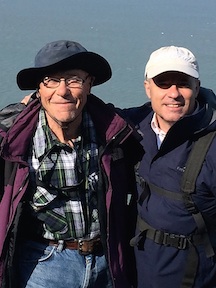Meet Stan and David Brooks, father and son ФВКs who were inducted as alumni members at the University of Wyoming this year. This form of honorary membership may be awarded by a chapter to alumni who merit recognition for their accomplishments after graduation.
Stan Brooks was born in Sinclair, Wyoming, and studied French, speech, and drama at the University of Wyoming where he also wrote for the literary magazine and participated in intercollegiate forensics. After graduating in 1954, he spent two years in France on Fulbright grants and two years in the U.S. Army. Then he began a long career as a Foreign Service officer. His first posting was to Vientiane, Laos. There he earned a reputation for being a “barefoot diplomat,” skilled at engaging people from every walk of society, from village chiefs to senior officials, the antithesis of an “ugly American.” During the Battle of Vientiane in 1960, he took part in a dramatic rescue of American captives, leading to an award from the State Department. Even more dramatically, he later married one of the ladies he had rescued, Claire Stevenson, a brave girl from Malden, Massachusetts, who was working with the US Agency for International Development. After two years of introductory Chinese language and area training and postings to Hong Kong, and Nepal–the latter during the Cultural Revolution in Tibet–he took up advanced Chinese language and area studies at the University of Michigan and returned to the State Department in the early 1970s. At the State Department and then at the U.S. Liaison Office in Beijing he participated in America’s diplomatic engagement with China marked by Nixon’s historic visit in 1972. In Beijing, Brooks led reporting on very eventful times–e.g, deaths of Zhou Enlai and Mao and the first Tianamen Incident all in 1976. He next led China reporting in Hong Kong. In the 1980s, he was consul general in Shanghai and deputy chief of mission in South Korea. He holds the State Department Distinguished Honor Award for his performance as chargé d’affaires in South Korea and received an award for his support of President Reagan’s visit to Shanghai in 1984. In the 1990s, he finished his China service as the director of the Taipei office of the American Institute in Taiwan, established after the US shifted diplomatic recognition from Taipei to Beijing. Paul Theroux recounts a number of conversations with him in Riding the Iron Rooster: By Train through China (Putnam, 1988). Since his retirement, he and Claire have returned to the West where he struggles with barbed wire and maintains their family ranch near Saratoga, Wyoming. In 2000 he was recognized with the Outstanding Alumnus Award of the University of Wyoming. He speaks fluent Chinese and French and is steeped in both cultures.
In 1976, before the US even opened diplomatic relations with China, David Brooks was among the first Americans to attend a public middle school in China. China was still under the influence of the Cultural Revolution, so part of his education there involved working in agricultural people’s communes and in factories. He finished high school in Hong Kong and attended the University of Wyoming from 1980 to 1984, graduating with a BA in English. After a period working and studying in England and America he opened the Shanghai office of an international law firm, Coudert Brothers. In 1988 he joined the Coca-Cola Company and was based not just in China (living variously in Hong Kong, Hainan, Shanghai, and Beijing), but also South Africa, Belgium, and the United States. He was responsible for Coca-Cola’s sponsorship and implementation of the first-ever global Olympic Torch Relay, covering 34 cities and 27 countries before ending in Athens in 2004 (the symbolism of which led to the book mentioned below). During his career at Coca-Cola, David emphasized sustainable business practices through a wide range of roles. Under his leadership, Coca-Cola are the only company to have sponsored all of China’s key international events over the past decades: the 2007 Shanghai Special Olympics, the 2008 Beijing Olympics and Paralympics, the 2010 Shanghai World Expo, and the 2011 Shenzhen Universiade. He was General Manager of the Beijing 2008 Olympic Games for Coca-Cola, China’s historic first Olympic Games. Prior to retiring, David served as President of the Greater China & Korea Business Unit of the company. This responsibility covered Mainland China, Taiwan, Hong Kong, Macau, South Korea, and Mongolia. He speaks, reads, and writes fluent Mandarin. He is a tireless advocate of the liberal arts, and the benefits that a humanities-based education brings to a professional career. His wife, Patricia Lambert, is a graduate of the School of Oriental and African Studies in London and a former cultural attaché in the Belgian diplomatic corps. Today she deals in art for galleries and museums. Together they have two sons, Oliver, a graduate of Bard College and Nicholas of Drexel University. David’s career is written up in various places online and in a book, John J. Macaloon, Bearing Light: Flame Relays and the Struggle for the Olympic Movement (Routledge, 2013).




